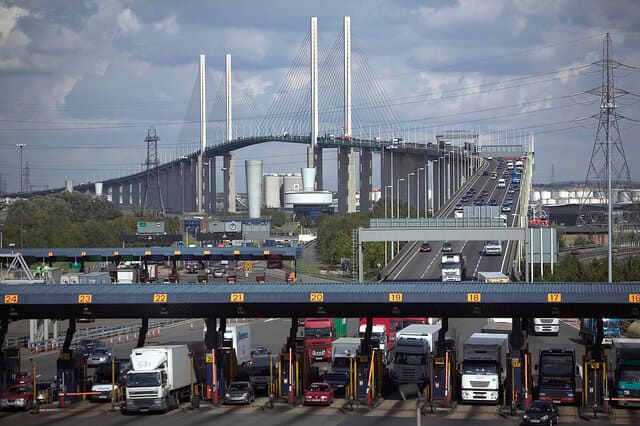 This month the Highways Agency is due to launch a new free-flow scheme at the Dartford Crossing which includes an electronic charging system that will do away with barriers and payment booths. However, the Agency has provided no official date for the opening of this system which is already weeks behind its initial launch date. In our previous blog – 4 ways to Make the Most out of your Motor Fleet – we discussed how fleet managers can reduce their running costs, which this new scheme could also help you achieve.
This month the Highways Agency is due to launch a new free-flow scheme at the Dartford Crossing which includes an electronic charging system that will do away with barriers and payment booths. However, the Agency has provided no official date for the opening of this system which is already weeks behind its initial launch date. In our previous blog – 4 ways to Make the Most out of your Motor Fleet – we discussed how fleet managers can reduce their running costs, which this new scheme could also help you achieve.
Fleet managers are understandably frustrated by this lack of information as according to the Highways Agency fleets could save up to a third on every passing through the crossing – money which could go towards other outgoings such as lease payments or fleet insurance.
However, the Agency has promised that all fleets will be contacted with information about the scheme and how to transfer to the new ‘DART’ charge before it goes live. A spokesman for the agency said: “We will do this very shortly and certainly in advance of DART Charge going live. We will do all we can to help all fleets prepare for the changes, and can reassure drivers that we’ll give them plenty of notice before the changes are introduced.”
Even though fleet decision makers are able to sign up for updates, the ACFO – an organisation for fleet operators – is unhappy with how little information has been provided so far. The chairman of the fleet decision-makers organisation, John Pryor, added: “Even at the end of October businesses had no idea of the start-date for the new system. They have been left in the dark and therefore have been unable to set up the appropriate in-house systems.
“DART Charge is not only a concern for fleets operating close to the Dartford Crossing. We have had fleets based in Scotland asking questions about how the system will work because they have not been able to gather information from the Highways Agency.”
Meanwhile, Simon Watts, fleet manager at East Sussex headquarter Rydon, said: “We are very frustrated with the lack of information from the Highways Agency. We need to digest what they are proposing and then get systems in place within our own business and communication information to drivers. We are getting to the eleventh hour and we are none the wiser.”
Apparently, staff at the Dartford Crossing office also have very little knowledge concerning the new scheme as Simon Watts failed to acquire any further information when making a personal visit. The new system is being brought in to decrease congestion as instead of motorists paying at the crossing there will be four new ways to pay: online, by phone, by post or via a payzone retail outlet. Companies can also set up pre-pay accounts for up to 999 vehicles which could be particularly beneficial to fleet managers.
Once the new system is complete, number plate recognition cameras, lasers and tag readers will charge appropriate fees for passing according to the Highways Agency. The money will be removed from fleets’ accounts and will show up within an hour via an online statement; however it could take longer if the number plate is damaged, unclear or missing, or if visibility is poor.
Discussing this issue, Pryor said: “There will be a significant number of fines levied on fleet vehicles as companies get to grips with how the system works. This is partly because the Highways Agency has provided little in the way of advance information.”
The ACFO has advised fleet managers to make sure that they have enough money in their accounts in order to avoid any fines or penalties on their vehicles. They also recommend fleet owners to keep all their information up to date and make sure that their drivers are not using the account for any personal journeys.
Pryor added: “Unlike the London Congestion Charge, the Severn Crossing or the M6 Toll there is no obvious alternative to the Dartford Crossing for drivers. I don’t think that most businesses will want to foot the cost of private journeys so employers have to establish an employee reimbursement system.”
The booths at the Dartford Crossing will be removed at the same time as the introduction of the new payment system, while the roads leading up to the crossing will also change. It is rumoured that by next spring the work will finally be completed, however it is expected for there to be a considerable amount of delays on the roads surrounding the crossing until then.
